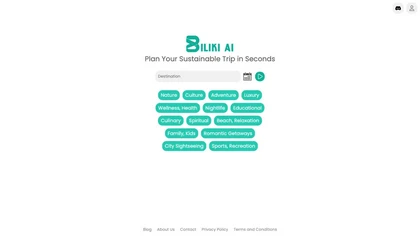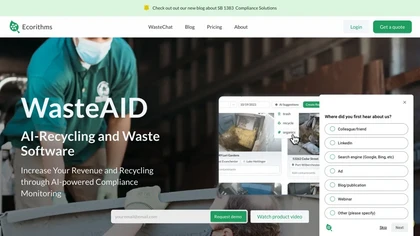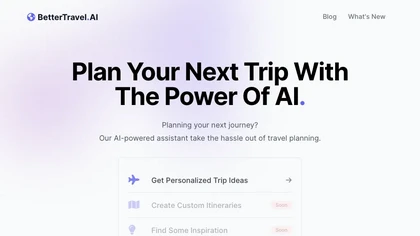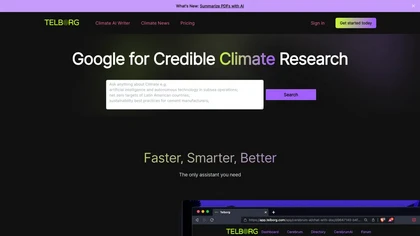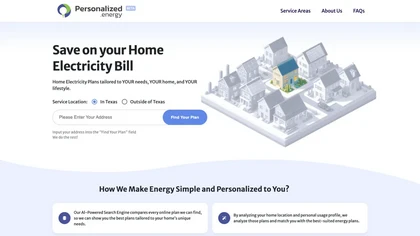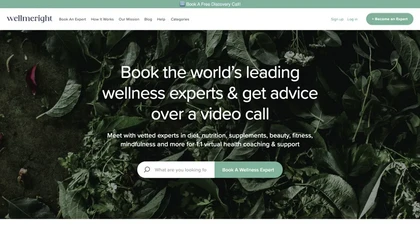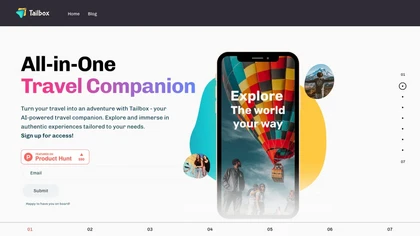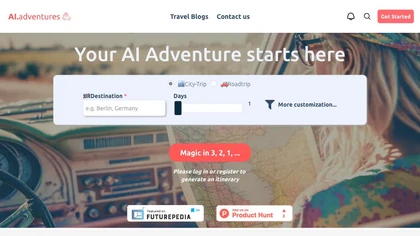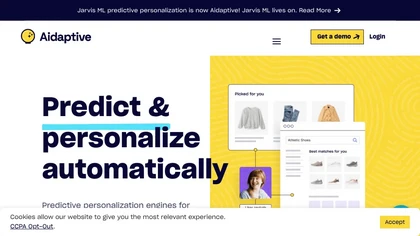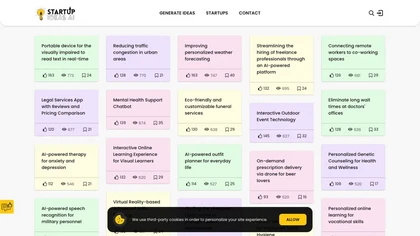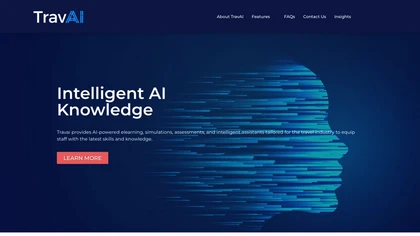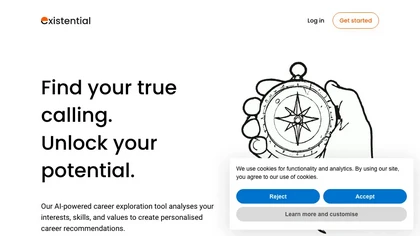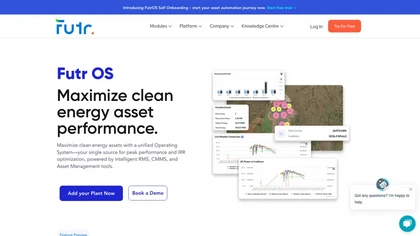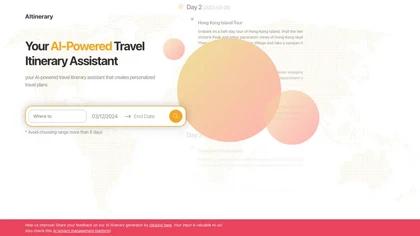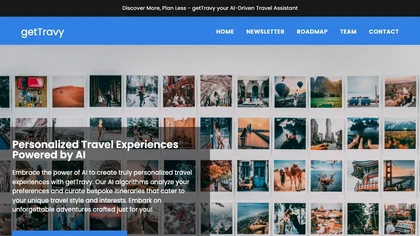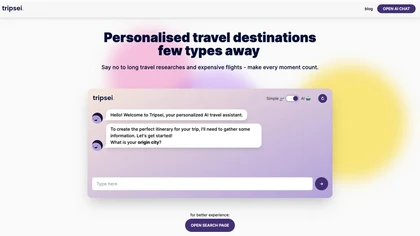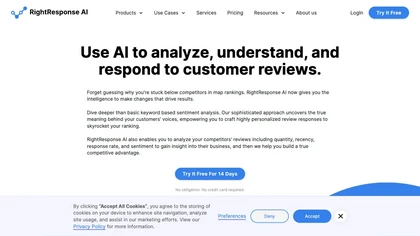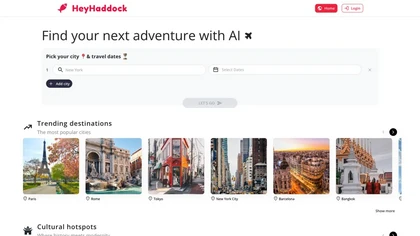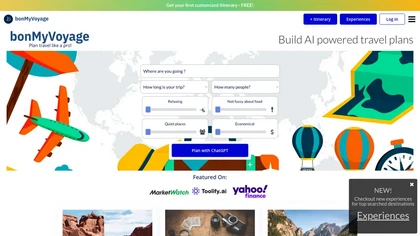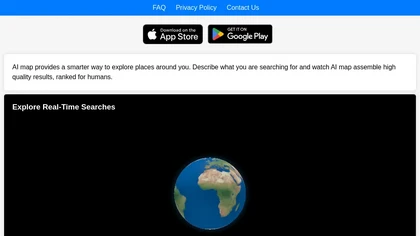AI use cases for Sustainability practices
Generative AI can be applied in various applications for sustainability practices. Here are some examples to explore below for inspiration with AI tools to get you started with using AI in sustainability practices.
🛠️ 70 AI tools for Sustainability practices
Explore a dynamic list of some of the most popular tools to get you started with various AI use cases and applications for Sustainability practices to streamline your workflows and productivity today.
Biliki AI features
- Custom itineraries generation
- Sustainable travel plans
Green Suggest features
- AI-powered upcycling suggestions
- Personalized upcycling ideas based on user preferences
- Vast database of relevant content and DIY tutorials
- Reduction of textile waste
- Promotion of eco-conscious fashion choices
WasteAID features
- Automatic route auditing
- Integration with existing systems
- Audit over 400k generators and 1m+ pickups
- Detect overflow incidents and identify contamination
- Tracking commercial account compliance
Bettertravel features
- Generate personalized travel recommendations
- Customize itineraries based on user preferences and interests
- Assist with travel planning without extensive research
- Easily input budget and travel plans
- Provide tailored recommendations for a more enjoyable trip
Proxy features
- Energy-efficient upgrades
- Carbon footprint reduction
- Utility bill savings
- Tax credits and rebates
- Energy efficiency analytics
Telborg features
- Summarization of PDFs
- Custom knowledge base for insightful answers
- Generation of fact-filled first drafts on climate topics
- Structured and accurate inputs for presentations and reports
- Blog section for staying informed on latest climate topics
Greenifs.ai features
- Detect greenwashing errors
- Ensure compliance with green marketing guidelines
- Check social media content for compliance with region-specific regulations
- Offer targeted corrections and recommendations
- Help avoid legal issues related to environmental laws
🔥
Create your account, save tools & get personal recommendations
Receive a weekly digest of our handpicked top tools.
Unsubscribe anytime
Personalized Energy features
- Personalized.energy AI tool
- Designed to simplify finding best-suited electricity plans
- Analyzes location and personal usage profile
- Presents tailored options fitting unique needs
- Automates research and comparison process
Planit Earth features
- Generate personalized itineraries
- Cater to traveler's interests and budget
- Provide detailed itineraries
- Easily accessible through a link or pdf
Gensbot
5Gensbot features
- Instant creation of personalized goods
- Generation of customized catalog based on user preferences
- Sustainability focus in AI designs
- Local production to minimize carbon emissions
- Token rewards system for unlocking future designs and exclusive offers
The Trip Boutique features
- Create itineraries
- Recommend destinations
- Leverage expert knowledge
- Curate database of places, activities and services
- Offer various integration options
Saara.io features
- Focus on solving common industry challenges
- Reduce operational costs
- Analyzing customer data for personalized offers and improved shopping experience
LookBook features
- Sustainable outfits
- Tailored to individual tastes
- User-friendly interface
- Virtual models
- Step-by-step guidance
Travelicious features
- Personalization of city destination experience
- Integration of AI for itinerary creation
- Recommendations based on user preferences
- Input destination, dates, budget, and interests for tailored journey
- City guide with recommendations on places to visit, eat, and explore
Guidie AI features
- personalized recommendations
- plan and optimize itinerary
- real-time updates
- mobile app
- location discovery
Well Me Right features
- AI matching and Health Coach capabilities
- Personalized coaching
- Dietary tracking, nutritional guidance
- Guided meditation sessions
- Adaptive health partner
Skoot features
- Customized itinerary planning
- Activity suggestions
- Restaurant recommendations
- Deal finding
- Budget considerations
Local Buddy features
- AI-powered travel planner
- Provides personalized recommendations
- Offers unique places to eat, landmarks to explore, and immersive activities
- Integrates with Google Maps for step-by-step directions
- Available on Android and iOS
Centenarian features
- Personalized sleep coaching
- One-on-one chat with ai sleep coach supercentenarian
- Track biometrics, environment, and progress
- Reminders and recommendations based on ai analysis of sleep data
Travelnaut features
- Destination planning
- Trip itineraries
- Sightseeing guides
- Nightlife guides
- Insider tips
Tailbox features
- Interactive maps
- Personalized experiences
- AI concierge services
- Curated recommendations for dining, sightseeing, and activities
- Travel community for connecting with other travelers
TripTrio features
- AI-powered travel planner
- Generates customized trip itineraries
- Personalizes itinerary based on user inputs
- Suggests recommended places to visit, activities, dining options
- Allows fine-tuning of itinerary and offline access
RecoFeed features
- Personalized recommendation feeds
- Cross-platform vector database (CloseVector)
- Local real-time recommendation generation
- Free basic services
- Closed beta phase
Faircado features
- Product search across multiple categories
- Integration into browsing experience
- Automatic search for pre-owned products
- Support for second-hand items
- Assistance in finding refurbished alternatives
WanderGenie features
- Personalized recommendations
- Hassle-free planning
- Exclusive launch-day deals
- Tailored dream trips
AI adventures
1.8AI adventures features
- Generate personalized travel plans
- Offer options for city trips, road trips, and custom itineraries
- Use openai's gpt4 model
- Interactive travel blogs
ThumbsUp features
- Collect user feedback
- Sentiment analysis
- Track keyword trends
- Automated data-driven recommendations
- Actionable insights
Silly Robot Cards features
- Design selection
- Photo upload
- Greeting card selection
- Personalization
- Shipping options
Aidaptive features
- Recommendations
- Pricing
- Search
- Merchandising
Treads Tire Subscription features
- AI-powered car management subscription service
- Simplifies tire maintenance, alignments, oil changes, wiper blades, and auto insurance
- Ability to select best tires from top brands
- Offers services like tire rotations, repairs, replacements, and roadside assistance
- Real-time safety recall notifications and commitment to environmental sustainability
Startup Ideas AI features
- Wide array of startup ideas generation
- Streamlining of hiring freelance professionals
- Connecting remote workers with co-working spaces
- Suggestions for eco-friendly customizable funeral services
- Real-time text reading for the visually impaired
TravAI features
- AI-powered eLearning
- Simulations
- Assessments
- Intelligent assistants tailored for travel industry
- Utilizes artificial intelligence for training course creation
Existential features
- Career exploration
- Interest analysis
- Skills assessment
- Value alignment
- Potential career path suggestion
FutrOS features
- Unified operating system
- Warranty management
- Digital twin technology
- Automated performance insights
- Real-time alerts
Siesta features
- Personalized marketing guide generation
- Survey completion in 15 minutes
- Tailored to unique business needs
- Step-by-step instructions
- Convenient to-do list for tracking progress
Tripper Guide features
- Personalized travel guide generation
- Customization of trip details
- Access to over 100,000 expertly curated travel guides
- Budget-friendly options
- Exploration of off-the-beaten-path adventures
Insightful features
- Provide personalized on-demand coaching
- Focus on specific needs
- Available anytime, anywhere
- Blog with latest insights on living a fulfilling life
- Accountability coaching to help young professionals reach full potential
AItinerary features
- AI-powered
- Creates personalized travel plans
- Meticulously plans each day
- Suggests activities and must-visit spots
- Provides suggestions for various experiences
MonteTravelo features
- Discover unique travel destinations
- Provide unusual accommodations
- Offer access to unique spas
- Guide thrill-seekers to adrenaline attractions
- Filter choices by continent
BodyGuru features
- Personalized wellness routines generation
- Tailored recommendations
- Free platform
- Upcoming features integration
- Developed by JBBAE
Gyroscope features
- Personalized guidance
- Video guides
- Tracking tools
- Insights through reports
- Custom workouts
Itair features
- Personalized itinerary generation
- Customized recommendations
- Instant itinerary creation
- Support for various interests and preferences
- Solo and group travel planning support
Summer AI features
- Ai gps technology
- Personalized experience
- Walking and driving navigation
- Augmented reality discoveries
- Visually enhanced journey
getTravy features
- Create personalized travel itineraries
- Simplify travel planning by taking care of transportation, activities, and attractions
- Craft tailor-made travel plans based on individual preferences
- Provide insights on remarkable attractions and experiences to unlock the true essence of each destination
- Offer exclusive news and custom travel plans through subscribing to their newsletter
SpoiledChild™ features
- Personalized product recommendations based on personal profile data
- Wide range of skin and hair products for age-control
- Utilization of proprietary machine learning algorithm
- Capsule culture subscription model with personalized capsule sequences
- Emphasis on sustainability with reusable and refillable glass dispensers
tripsei features
- Personalized travel options
- Cheapest flight ticket search
- Data-enriched travel suggestions
- Streamlining flight research process
- User-friendly AI chat interface
PlanTripAI features
- Trip planning
- Customized itinerary
- Personalized travel
- Generate based on interests
- Budget
Wonderplan features
- Personalized itinerary generation
- Customizable itinerary planning
- Real-time collaboration
- Trip feedback improvement
- Connecting with like-minded travelers
RightResponse AI features
- AI-driven platform
- Data storage management
- Privacy preference customization
- Data preference management
- Enhanced review reputation
PenPal features
- Digital NFC business card sharing
- AI clone for interactive virtual interactions
- Dashboard insights on card usage
- Custom engraving options
- Authentic self representation by AI clone
crossingminds.com features
- Data enrichment with intuitive tags and properties
- Personalized product recommendations for various industries
- Behavior-based approach to recommendations
- Seamless integration with existing tech stacks
- Driving cross-selling and upselling opportunities
ConsumerAI features
- Product recommendation
- Ai based
- Question
- Problem solving
Wanderias features
- AI-based personalized trip planning
- Utilizes advanced algorithms to analyze preferences
- Delivers tailored travel recommendations
- Efficiently completes vacation planning process in minutes
- User-friendly interface for creating and sharing personalized travel plans
Explorify features
- AI-powered
- Travel recommendation
- Personalized trip experience
- Curated recommendations
- Modify plans on the go
Nomadspot features
- Trip organization
- Create travel itinerary
- Personal map sharing
- Community sharing
- Ai-powered planner
TraveLandz features
- Personalized travel plans
- Real-time availability of hotels, attractions, and transportation
- Simplify the planning process for travelers
- Provide the best prices for hotels and activities through partnerships with travel agencies
- User-friendly interface allows for easy navigation and exploration of unique destinations
Speaktrackai features
- Voice message input for tracking various aspects of daily life
- Privacy focus with no data selling or targeted ads usage
- No app installation or sign-up required
- Actionable insights for informed decision-making
- Convenience and intelligence through AI-powered tracking and analysis
Mighty Travels features
- Sign-up
- Fares dashboard
- Real-time email alerts
- Airfare offers
- Error fares
- Hotel mistake rates
- Personal ai-powered travel assistant
- Thousands of detailed travel itineraries
- Destination guides
Tripplanner.ai features
- Suggest potential destinations
- Receive personalized itineraries
- Suggest nearby restaurants and attractions
- Plan a trip without having to research destinations and activities for hours
HeyHaddock features
- Trip planning assistance
- Personalized recommendations for popular destinations, cultural hotspots, best food spots, and beaches
- Collaboration features for creating travel plans with friends
- Generation of events and insights based on individual preferences
- Availability of heyhaddock team for step-by-step assistance
bonMyVoyage features
- AI-powered itinerary travel planner marketplace
- Customized travel plans creation
- Curated recommendations from verified users
- Tailored travel plans based on preferences
- Connect with verified locals for insider tips
F.I.R.E on track features
- AI-powered financial assistant
- Personalized recommendations based on goals
- Real-time financial assistance
- Income, expenses, and savings tracking
- Goal reminders and progress tracking
Orbt features
- Personalized travel itineraries
- AI technology integration
- Customized itinerary generation
- Newsletter subscription for travel trends
- Feature on ProductHunt
Travelities features
- Trip planning
- Personalized recommendations
- Travel deals
- Place recommendations
- Things to do
GenPark features
- Personalized content curation
- Advanced artificial intelligence utilization
- Tailored shopping journey
- Unique shopping experience
- Cutting-edge AI technology
Glow AI features
- Recommends personalized skincare routines
- Analyzes user inputs to generate customized recommendations
- Uses ai technology for analysis and recommendation generation
- Takes into account budget constraints
- Considers individual skin type needs
socialplaces.io features
Wertu features
- Sports travel planner
- Custom vacation planner
Suggest Gift features
- Suggesting great gift ideas
- Eliminating stress of gift-giving
- Using latest technology
- Input details about person and occasion
